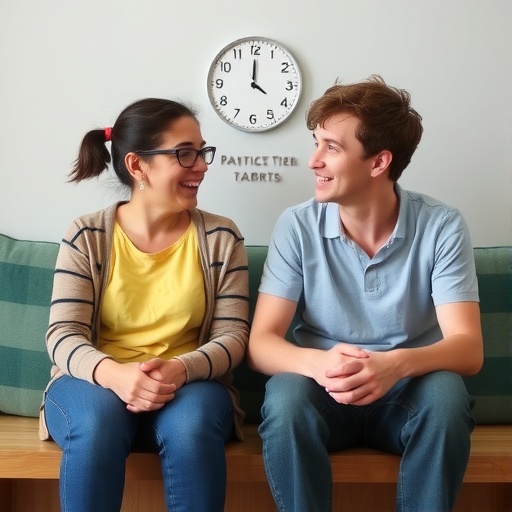In an epoch where the dialogue surrounding neurodiversity is becoming increasingly pivotal, a scholarly article, forthcoming in the Journal of Autism and Developmental Disorders, explores a transformative aspect of this discourse—transitioning autistic young adults into adulthood. This vital research, authored by a progressive team comprising Wolpe, Lee, Koenig, and others, delves into a myriad of recommendations articulated by autistic individuals themselves. Their insights not only challenge existing paradigms but also shed light on the complexities that are often overlooked in traditional transition models.
The focus on the transition from adolescence to adulthood is a critical one. For neurotypical individuals, this shift is often marked by excitement, personal growth, and societal acceptance. However, for autistic individuals, it can be fraught with challenges that are exacerbated by societal misconceptions and gaps in supportive infrastructure. The research conducted by this team offers a window into the lived experiences of autistic young adults, emphasizing the need for comprehensive acceptance, social preparation, and psychoeducation to ease this transition.
A significant finding that emerges from the research is the importance of acceptance, both from within the community and from society at large. Many autistic young adults expressed a profound desire for their identities to be acknowledged and celebrated rather than stigmatized. This longing for acceptance is not merely about tolerance; it encompasses a deep-seated wish for understanding and recognition of their unique experiences. Emphasizing this point, the authors advocate for community-based initiatives that foster an inclusive environment, enabling autistic individuals to feel valued and respected as they navigate adulthood.
Another pivotal theme in the research is the necessity of effective social preparation. Autistic young adults often face social challenges that can impede their ability to build relationships and integrate into wider societal contexts. The authors highlight that conventional social skills training programs frequently fail to resonate with autistic individuals because they do not consider the nuances of their social interactions. The research posits that tailored social preparation, which includes practical strategies and peer mentorship, could enhance social competence and confidence among autistic young adults.
Psychoeducation, as detailed in the study, is equally crucial in supporting autistic individuals during their transition to adulthood. This involves providing information not only about autism itself but also about the societal structures that they will encounter, such as the workplace, educational institutions, and healthcare systems. The need for psychoeducation is underscored by the considerable anxiety and uncertainty many autistic young adults feel when contemplating their futures. By empowering these individuals with knowledge and coping strategies, they can approach adulthood with a greater sense of agency and preparedness.
The researchers further discuss the role of family in facilitating a successful transition. Families often serve as primary support networks, and their understanding of autism plays a crucial role in shaping an autistic individual’s experience. The research suggests that families should be involved in transition planning, equipped with resources that will enable them to advocate effectively for their loved ones. Empathy and awareness within familial contexts can foster environments that celebrate individuality and promote resilience.
Moreover, the study brings to light the issues surrounding accessibility and opportunities in various domains such as employment and education. Despite legislative efforts to promote inclusivity, barriers still exist that inhibit autistic individuals from accessing meaningful work and educational experiences. The authors emphasize the necessity for employers and educational institutions to recognize the potential of autistic individuals while also ensuring that reasonable accommodations are provided. Inclusive hiring practices and special educational pathways can bridge the gap and offer autistic young adults the opportunities they deserve.
Collaboration emerges as a vital theme throughout the research. The authors call for a systemic approach that involves partnerships between autistic individuals, their families, educators, employers, and community services. These collaborations could result in a more cohesive approach to support systems, ultimately fostering an ecosystem where autistic individuals are not only prepared to transition but also empowered to thrive.
Equally impactful is the potential of peer support networks, highlighted in the findings. Autistic young adults expressed a desire to connect with one another, sharing their experiences and learning from each other’s journeys. These networks can serve as supportive conduits, providing affirmation and understanding that may be absent in traditional support systems. The value of peer mentorship cannot be overstated, as it cultivates a sense of belonging and community among autistic young adults.
In sum, Wolpe and colleagues present a holistic view of what it means to transition into adulthood as an autistic individual. Their findings call for a multidimensional approach that encompasses acceptance, social preparedness, and psychoeducational resources. The perspectives gathered from autistic young adults themselves provide invaluable insights that can reframe existing support structures and policies, urging stakeholders to listen and act with empathy.
As the research unfolds in the coming years, the hope is that it will not only ignite further discussions within academic circles but also instigate real change in the experiences of autistic individuals entering adulthood. The journey toward inclusivity and understanding remains ongoing, but with research like this, there is a brighter outlook on the horizon.
Subject of Research: Autism transition support for young adults
Article Title: Acceptance, Social Preparation, and Psychoeducation: Autistic Young Adults’ Recommendations for Transition to Adulthood
Article References:
Wolpe, S.M., Lee, M.N., Koenig, J. et al. Acceptance, Social Preparation, and Psychoeducation: Autistic Young Adults’ Recommendations for Transition to Adulthood.
J Autism Dev Disord (2025). https://doi.org/10.1007/s10803-025-07041-1
Image Credits: AI Generated
DOI:
Keywords: Autism, young adults, transition to adulthood, acceptance, psychoeducation, social preparation




